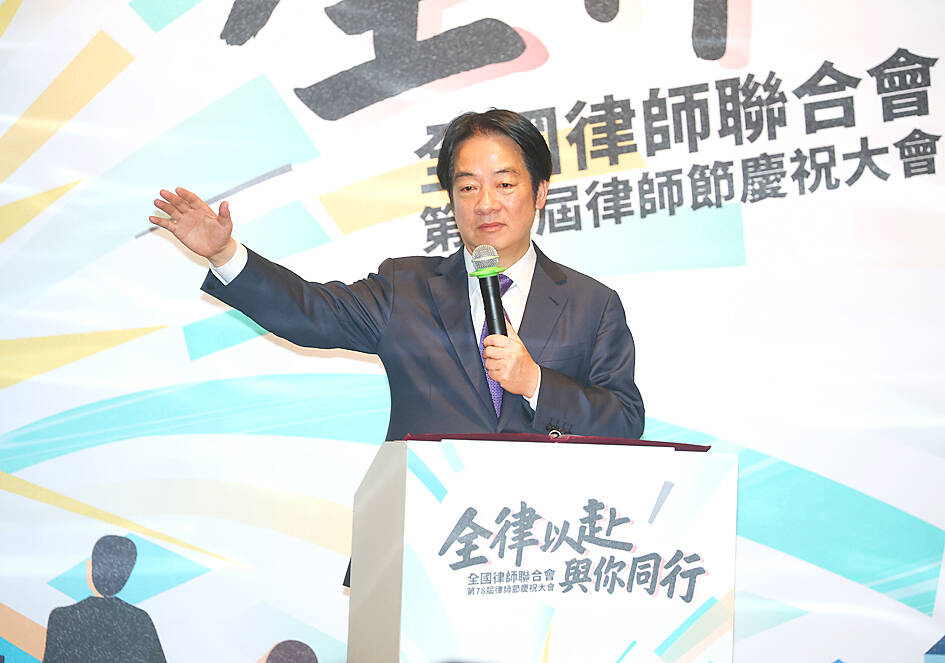The days of political intervention in the judiciary are gone, President William Lai (賴清德) said yesterday.
In his address at the Taiwan Bar Association’s Lawyers’ Day celebration, Lai said it took Taiwan decades to shift from autocracy to democracy, with judicial independence being one of the numerous achievements along the way.
He cited association president Lee Ling-ling (李玲玲) as saying that Taiwan shifted from autocracy to democracy thanks to lawyers’ sacrifices and contributions during the Taiwanese democratic movement.

Photo: CNA
“Lawyers were the vanguard of democratic change during the authoritarian martial law period. They are also the guardian of rule of law in democratic society,” Lai said, paying tribute to all layers nationwide ahead of Lawyers’ Day on Tuesday next week.
Lawyers are the cornerstone of law-based society and indispensable to people’s daily lives as well as judicial proceedings, he said, adding that it is lawyers who incorporate the law into people’s lives.
Lai said he expects the government to cooperate with the association to deepen legal education, not only for human rights protection, but also to enhance the public’s awareness of the rule of law.
“We should let people know that whether the investigation by prosecutors or the trial by court judges is based on professional independence and autonomy,” he added. “The era of executive intervention in judicial functions is over.”
The cooperation is also expected to help refine the legal system to empower frontline lawyers with greater space to apply their professional knowledge, Lai said.
For example, economic crimes, business secret protection and anti-fraud measures are all issues of serious public concern, and could be tackled through collaborations between the government and the legal profession to reduce their impact on society, he said.
Lai’s comments came as political rivals have, for months, accused the ruling Democratic Progressive Party (DPP) of using the judiciary to target the opposition.
The Chinese Nationalist Party (KMT) has criticized raids on its local chapters and the indictments of more than 100 people, including party officials, for signature forgery and violations of the Personal Data Protection Act (個人資料保護法) as politically motivated.
The raids and indictments took place amid heightened tensions between the KMT and the DPP, with both parties and their supporters attempting to launch recall petitions to remove each other’s lawmakers.
The Taiwan People’s Party has also protested the detention of its former chairman, Ko Wen-je (柯文哲), who has been indicted on corruption and other charges, with prosecutors seeking a prison sentence of 28 years and six months.
After being held for one year, Ko — a former Taipei mayor and presidential candidate last year — was granted bail on Friday.

Three batches of banana sauce imported from the Philippines were intercepted at the border after they were found to contain the banned industrial dye Orange G, the Food and Drug Administration (FDA) said yesterday. From today through Sept. 2 next year, all seasoning sauces from the Philippines are to be subject to the FDA’s strictest border inspection, meaning 100 percent testing for illegal dyes before entry is allowed, it said in a statement. Orange G is an industrial coloring agent that is not permitted for food use in Taiwan or internationally, said Cheng Wei-chih (鄭維智), head of the FDA’s Northern Center for

LOOKING NORTH: The base would enhance the military’s awareness of activities in the Bashi Channel, which China Coast Guard ships have been frequenting, an expert said The Philippine Navy on Thursday last week inaugurated a forward operating base in the country’s northern most province of Batanes, which at 185km from Taiwan would be strategically important in a military conflict in the Taiwan Strait. The Philippine Daily Inquirer quoted Northern Luzon Command Commander Lieutenant General Fernyl Buca as saying that the base in Mahatao would bolster the country’s northern defenses and response capabilities. The base is also a response to the “irregular presence this month of armed” of China Coast Guard vessels frequenting the Bashi Channel in the Luzon Strait just south of Taiwan, the paper reported, citing a

The Chinese military has built landing bridge ships designed to expand its amphibious options for a potential assault on Taiwan, but their combat effectiveness is limited due to their high vulnerability, a defense expert said in an analysis published on Monday. Shen Ming-shih (沈明室), a research fellow at the Institute for National Defense and Security Research, said that the deployment of such vessels as part of the Chinese People’s Liberation Army (PLA) Navy’s East Sea Fleet signals a strong focus on Taiwan. However, the ships are highly vulnerable to precision strikes, which means they could be destroyed before they achieve their intended

UNDER PRESSURE: The report cited numerous events that have happened this year to show increased coercion from China, such as military drills and legal threats The Chinese Communist Party (CCP) aims to reinforce its “one China” principle and the idea that Taiwan belongs to the People’s Republic of China by hosting celebratory events this year for the 80th anniversary of the end of World War II, the “retrocession” of Taiwan and the establishment of the UN, the Mainland Affairs Council (MAC) said in its latest report to the Legislative Yuan. Taking advantage of the significant anniversaries, Chinese officials are attempting to assert China’s sovereignty over Taiwan through interviews with international news media and cross-strait exchange events, the report said. Beijing intends to reinforce its “one China” principle